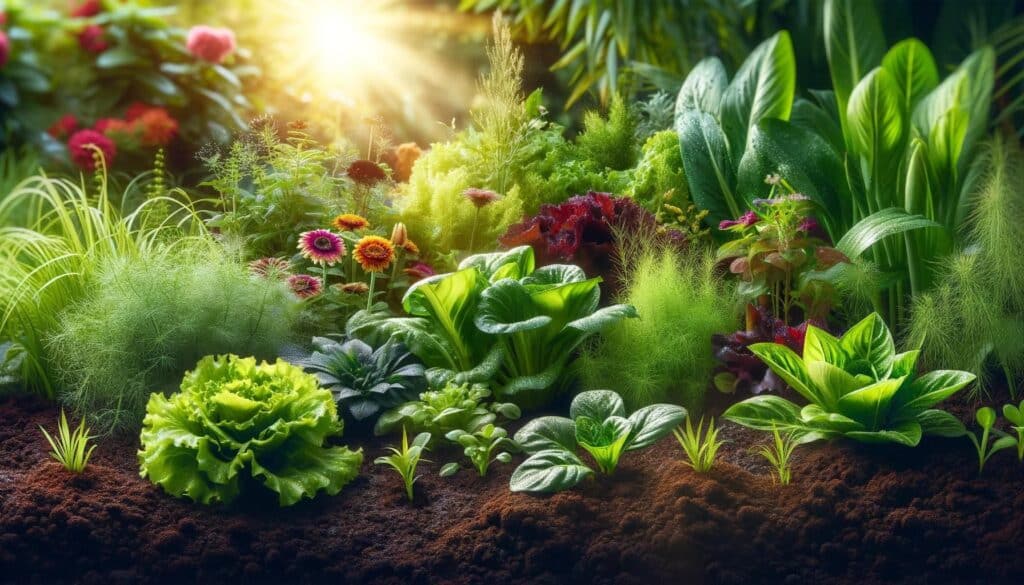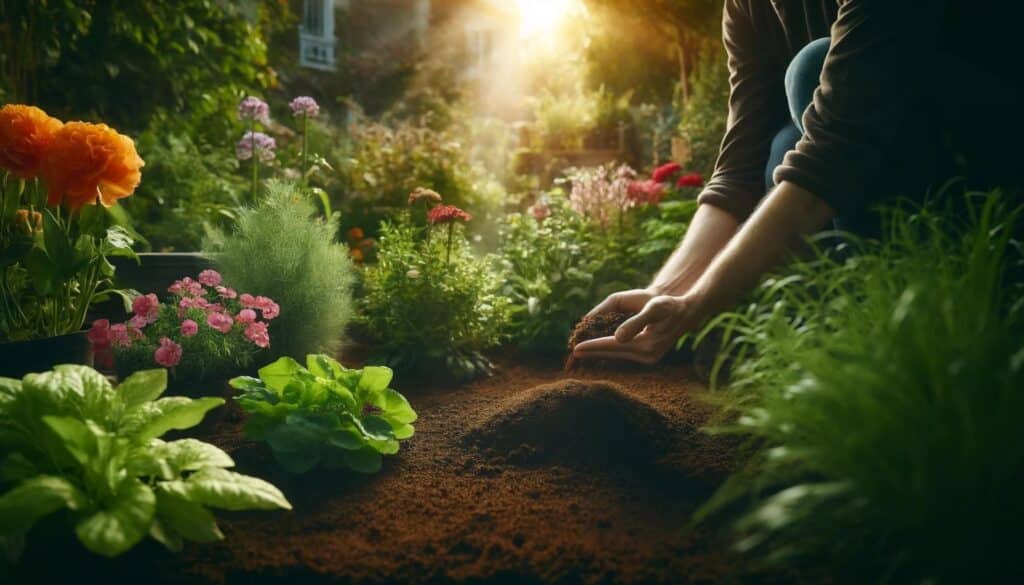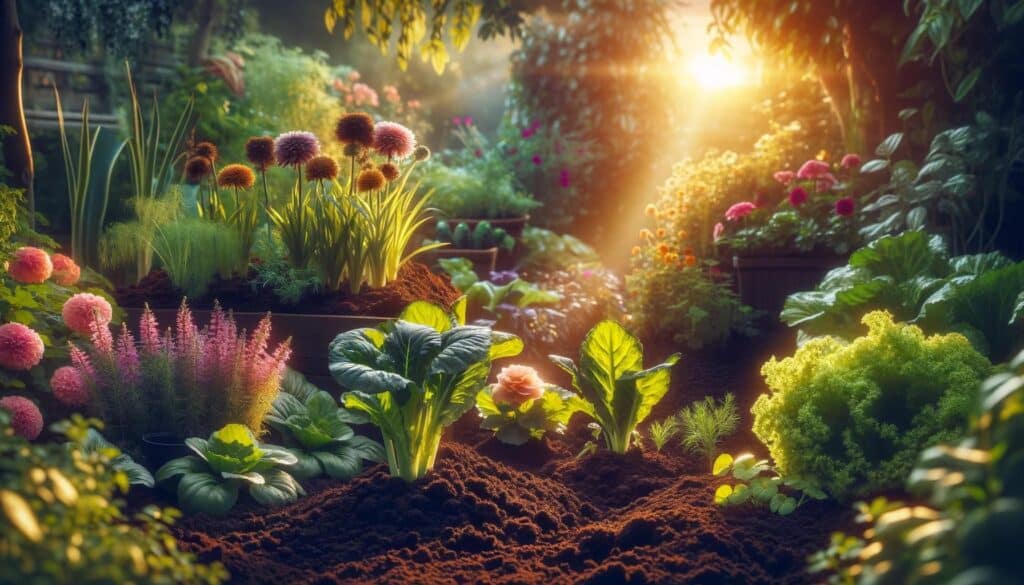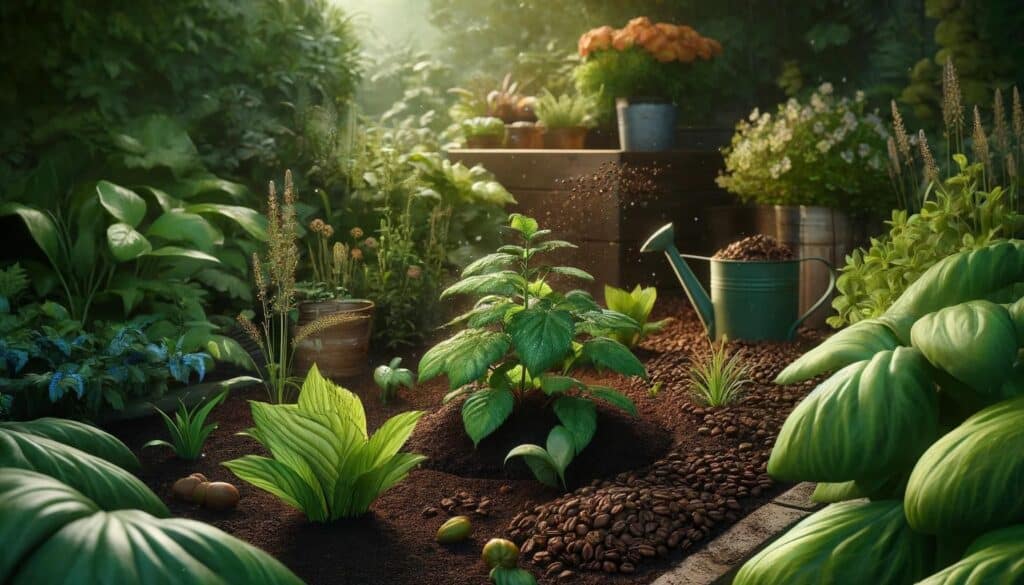In recent years, the practice of recycling coffee grounds for gardening has become increasingly popular among both casual gardeners and horticultural enthusiasts. This surge in popularity can be attributed to the growing interest in sustainable gardening practices and the appeal of utilizing everyday waste in an environmentally beneficial manner. Coffee grounds, often readily available in large quantities in households and cafes, offer a potentially nutrient-rich addition to garden soil.
Are Coffee Grounds Good for Plants?
Yes, coffee grounds can be good for plants as they enrich the soil with nitrogen and improve its structure, enhancing water retention and aeration. They also act as a natural pest repellent and promote beneficial fungal growth. However, it’s important to use them in moderation and preferably composted, especially if they are fresh, to avoid issues with acidity and excessive moisture retention.
The purpose of this article is to explore whether coffee grounds truly benefit plant health and soil quality, and under what conditions their use might be most effective. We will delve into the scientific and anecdotal evidence surrounding the use of coffee grounds in gardening, discussing both their benefits and potential drawbacks. The article is structured to first introduce the composition of coffee grounds, followed by an examination of their pros and cons for plant care. We will then provide practical advice on how to use coffee grounds correctly in the garden, backed by insights from experts and case studies of successful applications.
By dissecting the myths and truths about this common kitchen waste product, this article aims to provide a comprehensive guide for gardeners looking to make informed decisions about using coffee grounds to enhance their garden’s health and productivity.
The Composition of Coffee Grounds

Key Nutrients Found in Coffee Grounds
Coffee grounds are rich in several essential nutrients that are beneficial for plant growth. These include:
- Nitrogen: This is a crucial component of chlorophyll and is vital for plant growth. Coffee grounds release nitrogen into the soil as they decompose, providing a slow-release source of this important nutrient.
- Potassium: Important for overall plant health, potassium aids in various plant functions, including water uptake and the synthesis of photosynthetic enzymes.
- Phosphorus: Essential for the development of roots and flowers, phosphorus in coffee grounds can help enhance plant growth.
- Magnesium: Integral for the synthesis of chlorophyll, magnesium in coffee grounds can help in the greening of plants.
These nutrients make coffee grounds an excellent amendment for promoting healthy plant growth. However, it’s important to note that the nutritional content can vary based on the type of coffee and the brewing method.
Comparison of Coffee Grounds with Compost and Fertilizers
When compared to traditional compost and synthetic fertilizers, coffee grounds have distinct characteristics and advantages:
- Nutrient Release: Coffee grounds decompose slower than some other organic materials, resulting in a more gradual release of nutrients, which can be beneficial for maintaining long-term soil health without the risk of nutrient leaching.
- pH Level: Fresh coffee grounds are generally acidic (with a pH of about 6.5 to 6.8), which can be beneficial for acid-loving plants when used in moderation. However, the acidity can diminish somewhat after brewing.
- Organic Matter: Like traditional compost, coffee grounds add organic matter to the soil, which improves soil structure, aeration, and water retention.
- Environmental Impact: Using coffee grounds as a soil amendment is an excellent way to recycle waste that might otherwise end up in landfills, thereby reducing environmental impact, unlike synthetic fertilizers which often come with a higher environmental cost due to their production and transportation.
While coffee grounds offer many benefits similar to traditional compost, they should ideally be used as a supplement to a balanced soil amendment strategy rather than a complete replacement for standard fertilizers or compost. This ensures that plants receive a well-rounded diet of nutrients necessary for optimal growth.
Benefits of Using Coffee Grounds for Plants

Nutrient Supply
Coffee grounds are a notable source of several essential nutrients that are beneficial to plant growth. Here’s how these elements support garden health:
- Nitrogen: As a key component of amino acids and proteins, nitrogen is crucial for leaf and stem growth. Coffee grounds slowly release nitrogen into the soil, which plants use to grow lush, vibrant foliage.
- Potassium: This nutrient plays a significant role in the regulation of various physiological processes, including photosynthesis, nutrient absorption, and enzyme activation. Potassium also helps strengthen plants’ resistance to diseases and aids in water regulation.
- Phosphorus: Critical for the formation of DNA, RNA, and ATP, phosphorus is vital for energy transfer and photosynthesis. It promotes strong root development and increases the blooming potential and fruit production of plants.
Soil Improvement
The incorporation of coffee grounds into garden soil can significantly enhance its quality:
- Enhancement of Soil Structure and Aeration: Coffee grounds help to loosen compacted soil, thereby improving aeration. This allows roots to expand more easily and access the oxygen they require for growth.
- Effects on Water Retention and Drainage: Coffee grounds can improve the soil’s ability to retain moisture while also ensuring better drainage. This dual action helps in maintaining an optimal balance of moisture in the soil, which is beneficial for most plants.
Pest Repellent Properties
Coffee grounds have been touted for their natural ability to repel certain garden pests:
- Natural Deterrent: The caffeine and diterpenes in coffee grounds are believed to be natural deterrents for pests like slugs and ants. By creating a barrier with coffee grounds around plants, gardeners can protect them from these invaders.
- Anecdotal and Scientific Evidence: Many gardeners report successful pest control with coffee grounds, although scientific studies are limited. Some research suggests that the caffeine can indeed affect pests negatively, reducing the number of insects that would otherwise attack plants.
These benefits make coffee grounds a versatile and useful addition to the garden, helping not only in boosting plant growth and health but also in enhancing soil quality and providing a measure of pest control. However, it’s important to use coffee grounds judiciously and in combination with other organic materials to ensure the best results.
Drawbacks of Using Coffee Grounds in Gardening

Acidic Nature
While many plants benefit from slightly acidic soil, using coffee grounds can pose risks for plants sensitive to acidity:
- Potential Risks for Acid-Sensitive Plants: Plants such as lavender, alyssum, and some types of geraniums prefer neutral to alkaline soils. Regular application of coffee grounds around these plants can lead to stunted growth and nutrient deficiencies as soil acidity increases.
- Testing Soil pH and Its Importance: Knowing the pH level of your garden soil is crucial before introducing any amendments like coffee grounds. Soil pH affects nutrient availability and plant health. Gardeners can use a home testing kit or seek professional soil testing to determine the pH. Adjusting your gardening practices based on these results ensures that you enhance, rather than disrupt, the growing conditions.
Caffeine Content
Caffeine in coffee grounds can have inhibitory effects on plant growth, particularly if used excessively:
- Effects of Caffeine on Plant Growth: Although it’s present in relatively low concentrations in spent coffee grounds, caffeine can inhibit seed germination and root growth in some plants.
- Plants More Sensitive to Caffeine: Young seedlings, and certain species like orchids, clovers, and nightshades, might be more vulnerable to caffeine’s negative effects. It’s advisable to avoid using coffee grounds around these plants to prevent growth issues.
Mold and Fungal Growth
Wet coffee grounds can become a breeding ground for mold and fungi, which could pose a risk to plant health:
- Risks Associated with Wet Coffee Grounds: If not properly managed, the moisture in coffee grounds can encourage the growth of mold and fungus. This can lead to fungal diseases that might affect plant health and soil quality.
- Preventive Measures to Avoid Fungal Issues: To mitigate this risk, coffee grounds should be dried or composted before use in the garden. Mixing coffee grounds with other compost materials can help balance moisture levels and reduce the chances of mold growth. Additionally, applying a thin layer of coffee grounds and incorporating them into the soil can prevent the formation of a compact layer that retains moisture excessively.
Using coffee grounds in gardening can offer numerous benefits, but it’s also essential to be aware of these potential drawbacks. By understanding and managing these risks, gardeners can effectively utilize coffee grounds to enhance their garden’s productivity and health without unintended negative effects.
How to Use Coffee Grounds Correctly

Using coffee grounds in gardening requires thoughtful preparation and application to maximize their benefits and minimize potential issues. Here’s how you can do this effectively:
Proper Preparation and Application
- Drying and Storing Coffee Grounds: To prevent mold and fungal growth, it’s important to dry out coffee grounds before use. Spread them out on a flat surface, like a baking sheet, and allow them to dry completely. Once dry, store them in a breathable container to avoid moisture buildup.
- Recommended Quantities and Methods of Application: To avoid over-acidifying the soil or causing nutrient imbalances, use coffee grounds sparingly. A thin layer (no more than half an inch) can be sprinkled around plants or mixed into the top few inches of soil. For larger garden areas, mixing coffee grounds with other soil amendments before application is recommended.
Suitable Plants
- Identifying Plants That Benefit the Most from Coffee Grounds: Acid-loving plants like roses, azaleas, rhododendrons, and blueberries can benefit from the slight acidity coffee grounds provide. These plants thrive in environments where they can absorb extra nitrogen and other nutrients that coffee grounds offer.
- Tips for Using Coffee Grounds with Vegetable Gardens: When used in vegetable gardens, coffee grounds should be used with caution. They are particularly beneficial for fast-growing vegetables that require high nitrogen, such as tomatoes and leafy greens. However, always ensure the grounds are well-composted before integrating them into vegetable garden soil to prevent any negative effects from fresh grounds.
Combining Coffee Grounds with Other Organic Materials
- How to Integrate Coffee Grounds into a Balanced Compost Mix: Coffee grounds should ideally make up no more than 20% of the total material in a compost pile. Mix them with a variety of other organic materials such as leaves, grass clippings, and kitchen scraps. This variety ensures a balanced nutrient mix and helps maintain proper compost aeration and temperature.
- Benefits of Creating a Diverse Compost Environment: Incorporating coffee grounds in a diverse compost mix helps improve the overall quality of the compost. It enriches the compost with nitrogen, an essential element for composting, which aids in breaking down organic matter more efficiently. A well-balanced compost provides plants with a rich array of nutrients necessary for optimal growth and helps in soil conditioning.
By following these guidelines, gardeners can successfully harness the benefits of coffee grounds to improve soil health, enhance plant growth, and contribute to a more sustainable gardening practice.
Conclusion
Throughout this article, we have explored the multifaceted role that coffee grounds can play in gardening. From their nutrient-rich composition to their practical applications, coffee grounds offer an eco-friendly option for enriching garden soil and promoting plant health. Key nutrients such as nitrogen, potassium, and phosphorus present in coffee grounds can significantly aid in plant growth, especially for acid-loving plants.
However, the use of coffee grounds is not without its caveats. Their acidic nature and caffeine content require careful management to avoid potential harm to sensitive plants and to prevent soil imbalance. Furthermore, the risk of mold and fungal growth associated with moist coffee grounds necessitates proper drying and storage practices.
Properly prepared and applied, coffee grounds can be an excellent addition to garden soil, either directly or as part of a compost mix. They are particularly beneficial for plants that thrive in acidic conditions and can help improve soil structure, moisture retention, and pest control. When integrating coffee grounds into your gardening practice, it is crucial to do so thoughtfully and sparingly, balancing their use with other organic materials to create a diverse and healthy garden ecosystem.
In conclusion, while coffee grounds can be a valuable resource for gardeners, their effectiveness and appropriateness depend largely on the specific needs of the garden and the plants within it. By understanding both the benefits and potential drawbacks of using coffee grounds, gardeners can make informed decisions that enhance their garden’s productivity and sustainability.
Frequently Asked Questions About Using Coffee Grounds for Plants
1. Can I use coffee grounds directly on my plants?
Yes, you can use coffee grounds directly on your plants, but it’s best to sprinkle them thinly around the plant base. Avoid piling them as they can form a barrier and restrict water and air flow to the soil. Incorporating them into the soil or compost is often more effective.
2. Are coffee grounds good for all types of plants?
Coffee grounds are particularly beneficial for acid-loving plants such as azaleas, rhododendrons, camellias, hydrangeas, and blueberries. However, plants that prefer neutral to alkaline soils, such as lavender and most types of ferns, may not respond well to coffee grounds.
3. How often should I add coffee grounds to my garden?
This depends on the specific needs of your plants and the existing soil conditions. As a general rule, you can add a thin layer of coffee grounds to your soil about once a month. Always monitor your plants for any signs of distress that might indicate overuse.
4. Do coffee grounds repel pests?
Yes, coffee grounds have been known to deter certain types of garden pests, including slugs and ants, due to their caffeine and diterpene content. However, results can vary, and they should not be solely relied upon for pest control.
5. Can coffee grounds make my soil too acidic?
Coffee grounds can lower the pH level of your soil over time, which can be beneficial for acid-loving plants but detrimental to others. It’s important to regularly test your soil’s pH and observe plant responses to avoid making the soil too acidic for certain plants.
6. How should I store coffee grounds before using them in my garden?
Dry the coffee grounds completely by spreading them out on a flat surface in a cool, dry area. Once dried, store them in a breathable container such as a burlap sack or open bucket to prevent mold growth.
7. Can I add coffee grounds to my compost bin?
Yes, coffee grounds are an excellent addition to your compost bin. They are considered a green compost material (nitrogen-rich) and should be balanced with brown compost material (carbon-rich) such as dry leaves, straw, or shredded newspaper.
8. Do I need to wash coffee grounds before using them in the garden?
No, you do not need to wash coffee grounds before using them in the garden. The small amount of residual coffee is not harmful and can actually contribute to the nutrient content.
9. What is the best way to apply coffee grounds to potted plants?
For potted plants, mix coffee grounds with potting soil or compost before potting or sprinkle a small amount on the topsoil. As with garden use, avoid applying too thick a layer to prevent issues with moisture and aeration.
10. Are there any plants that should definitely avoid coffee grounds?
Yes, plants that require a high pH level or are sensitive to caffeine, such as orchids and certain geraniums, should avoid coffee grounds. Always research or consult an expert about your specific plant varieties before applying coffee grounds.






